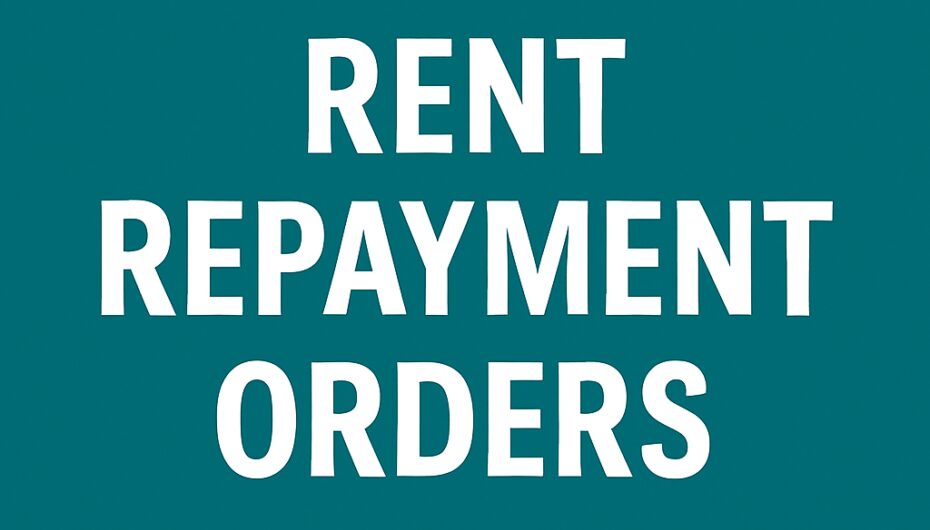 6th June 2025
6th June 2025
Rent Repayment Orders: What Landlords Need to Know and How to Stay Protected
As a landlord, you strive to offer safe, legal, and well-managed homes. But in today’s increasingly regulated rental landscape, one misstep, whether intentional or not, can have significant consequences. One such consequence is a Rent Repayment Order (RRO).
So, what exactly is an RRO? How do they work? And, most importantly, how can you avoid one?
Let’s break it all down.
What is a Rent Repayment Order (RRO)?
A Rent Repayment Order is a legal tool that allows tenants, or local authorities, to claim back up to 12 months’ rent (scheduled to change to 24 months under the Renters’ Right Act) from a landlord who has committed certain housing-related offences.
These aren’t minor breaches. We’re talking about serious non-compliance with your legal obligations. The legislation governing RROs sits under the Housing and Planning Act 2016, which significantly expanded their use beyond the older Housing Act 2004.
When Can an RRO Be Issued?
RROs can be issued even if the landlord hasn’t been prosecuted, provided a First-tier Tribunal is satisfied, on the balance of probabilities, that the offence occurred.
Offences that can lead to an RRO include:
- Failure to license a property (e.g., mandatory HMO or selective licensing)
- Illegal eviction or harassment of a tenant
- Breaches of improvement notices or prohibition orders issued by the local authority
- Violence for securing entry under the Criminal Law Act 1977
These are not speculative scenarios. Between 2019 and 2022, local authorities and tenants filed over 1,000 RRO applications, with the average repayment order being £4,800, and some exceeding £20,000, especially in London.
Who Can Apply for an RRO?
- Tenants: Can apply directly to the Tribunal if they believe an offence has occurred.
- Local Authorities: Often pursue RROs to recover housing benefit or Universal Credit paid during the offending period.
Unlike many court proceedings, tenants do not need legal representation, and legal aid isn’t required, making it more accessible, and more likely, that landlords who breach the rules will face claims.
How Does the RRO Process Work?
- Application Submitted: By tenant or local authority to the First-tier Tribunal (Property Chamber).
- Evidence Considered: The Tribunal doesn’t need a criminal conviction, just evidence the offence likely occurred.
- Hearing Held: Landlords can present a defence and mitigating factors.
- Order Made: If the Tribunal agrees, they’ll order the landlord to repay rent.
Key Legal Point:
Even repentance after the fact, such as obtaining a license belatedly, doesn’t necessarily stop an RRO. It may only reduce the amount payable.
Recent Real-World Example
In R. v. Ahmed (2021), a landlord failed to license a property in a selective licensing area. Though no prosecution occurred, the Tribunal found the evidence sufficient and ordered repayment of £11,500 in rent to the tenant.
It was a harsh reminder that lack of awareness is no defence.
How to Avoid a Rent Repayment Order
The good news? RROs are entirely avoidable. Here’s how:
1. Check Licensing Requirements Every Time
Don’t assume a property doesn’t need a license just because it didn’t before. Licensing schemes change frequently, check with your local authority or your letting agent.
2. Keep Documentation Impeccable
Maintain evidence of licenses, gas safety certificates, EPCs, deposit protection, and tenancy agreements.
3. Act on Council Notices Promptly
If you receive an improvement notice or any correspondence from the council, take it seriously and act fast. Delays could escalate to RRO territory.
4. Use a Professional Letting Agent
An experienced agent, like Boydens, can keep you legally compliant, advise on local licensing, and handle tenant communications, dramatically reducing your risk exposure.
5. Stay Informed
Laws change, enforcement increases, and expectations rise. Work with partners who prioritise legal compliance, not just filling tenancies.
Boydens: Your Legal Safety Net in Lettings
As a family-run estate and letting agent since 1966, Boydens understands the balance of care, compliance, and community trust. Our fully managed services take the weight off your shoulders, ensuring your property is legally sound, and your tenants, happy.
If you’re unsure about your compliance, or simply want to future-proof your lettings business, get in touch with our expert team today.
📞 Call us | ✉️ Email us | 💬 Or pop into your local Boydens branch







